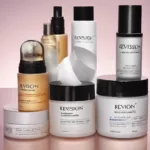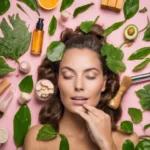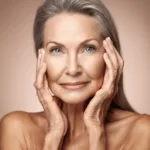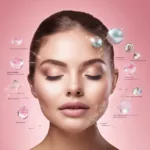26 December 2023
The rise of Gen-Z’s focus on anti-aging products and treatments is reshaping the beauty industry and challenging traditional notions of aging.
Influencer Emma Brooks never thought much about aging until she turned 20. Suddenly, she found herself worrying about her future appearance and how she would look in the years to come. Brooks is not alone in her concerns. Gen-Z, despite being in their early twenties, is already anxious about looking older. This generation is embracing prevention rather than correction, opting for makeup products with anti-aging benefits and incorporating anti-aging serums into their daily routines. The popularity of these practices is creating a new market opportunity for beauty brands and reshaping the way we think about aging.
The Rise of Preventative Aging:
Gen-Z’s obsession with anti-aging can be attributed to their increased exposure to social media platforms like Instagram, TikTok, and Zoom. These platforms have made individuals more self-conscious about their appearance, leading them to share routines aimed at “preventative aging.” This includes using retinoids, vitamin C, and sunscreen, as well as experimenting with face tape and “baby botox” to prevent the formation of lines and wrinkles. The demand for botox, dermal fillers, and retinol has seen a significant increase this year, indicating Gen-Z’s focus on prevention.
Changing Business Models:
Beauty brands are adapting to Gen-Z’s focus on prevention and anti-aging treatments. The volume of skincare and beauty products referencing anti-aging has risen by 10 percent in the past two years. Searches for sunscreen have tripled, and there are now three times as many sunscreen products on the market compared to three years ago. Brands specifically tailored to young skin are emerging, offering products that cater to the unique needs of Gen-Z. Additionally, injectables like Botox are gaining popularity among young people due to their immediate results.
The Wellness-Centric Rebrand:
Gen-Z’s knowledge of skincare, aging, and environmental stressors has given anti-aging a wellness-centric rebrand. Young individuals like Dylan Heberle, a 26-year-old consultant, view skincare as tied to health and prioritize sunscreen as a preventive measure against skin cancer and wrinkles. They see their nightly skincare routine as a habit akin to exercise, reflecting the rise of all-encompassing self-care and the desire to take better care of oneself.
The Impact of Social Media:
Social media plays a significant role in Gen-Z’s obsession with anti-aging. Hashtags like #antiageing have billions of views on platforms like TikTok, and filters that simulate the aging process have gone viral. Gen-Z’s candor on social media has fueled demand for treatments, with many young individuals sharing their experiences through videos and testimonials. Education also plays a crucial role, with dermatologists and influencers providing skincare advice to the masses, although misinformation and premature use of harsh chemicals can be a concern.
Conclusion:
Gen-Z’s focus on anti-aging is reshaping the beauty industry and challenging traditional notions of aging. This generation’s emphasis on prevention rather than correction has created a market opportunity for brands to cater to their unique needs and preferences. However, it is essential to ensure that the information they receive is accurate and that they are educated about the potential risks of premature use of anti-aging treatments. As Gen-Z continues to navigate their way in the world, their obsession with anti-aging serves as a reminder that they are young to be so worried about growing old.



